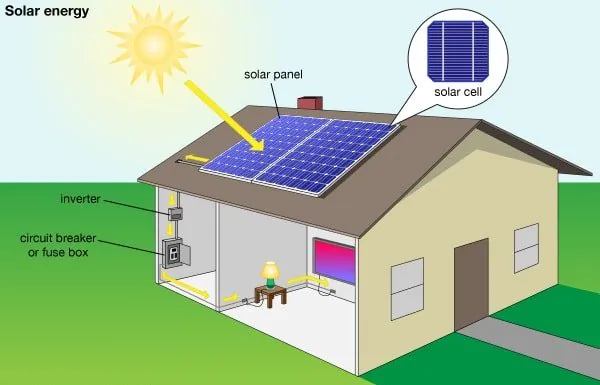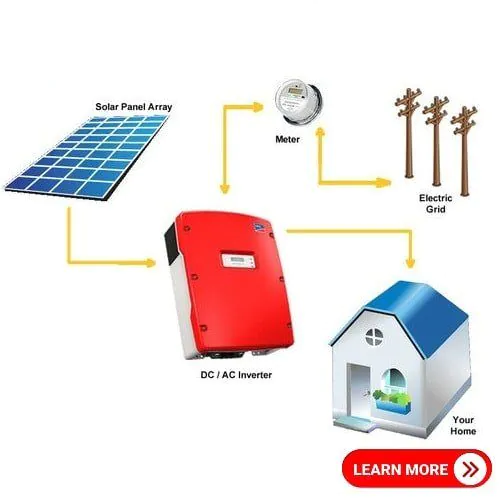Solar System Price - On Grid, Off Grid, and Hybrid System
Solar System: An Overview
A solar system refers to a system that utilizes solar panels to capture sunlight and convert it into electricity. It is a sustainable and renewable energy solution that reduces reliance on traditional fossil fuel-based electricity generation.
How Does a Solar System Work?

A solar system works through the following process:
- Solar Panels: Solar panels, also known as photovoltaic (PV) panels, consist of multiple solar cells made of semiconductor materials such as silicon. When sunlight hits these cells, it excites the electrons, generating a flow of direct current (DC) electricity.
- Inverters: The DC electricity generated by solar panels is converted into alternating current (AC) electricity through inverters. AC electricity is the standard form of electricity used in homes and businesses.
- Electrical System: The AC electricity produced by the inverters is fed into the electrical system of the building or facility, providing power to electrical appliances and devices.
- Grid Connection (if applicable): In grid-connected solar systems, excess electricity produced by the solar system can be fed back into the electrical grid. This process is known as net metering, allowing homeowners or businesses to receive credits or compensation for the electricity they contribute to the grid.
Price List of On-Grid Solar System in India 2023
| On-Grid Solar Model (kW) | Selling Price | Price Per Watt |
|---|---|---|
| 1kW Solar System | Rs. 73,976 | Rs. 73.96 |
| 2kW Solar System | Rs. 82,281 | Rs. 41.15 |
| 3kW Solar System | Rs. 1,15,482 | Rs. 38.50 |
| 5kW Solar System | Rs. 1,74,878 | Rs. 34.98 |
| 6kW Solar System | Rs. 2,09,369 | Rs. 34.90 |
| 8kW Solar System | Rs. 2,85,748 | Rs. 35.72 |
| 10kW Solar System | Rs. 3,76,291 | Rs. 37.62 |
Components of a Solar System
A solar system comprises several key components that work together to generate electricity:
1. Solar Panels
Solar panels are the primary component of a solar system. They consist of solar cells that convert sunlight into electricity. Solar panels are typically mounted on rooftops or ground-mounted structures to maximize sun exposure.
2. Inverters
Inverters are responsible for converting the DC electricity generated by the solar panels into AC electricity that can be used to power electrical devices and appliances. They ensure compatibility with the existing electrical system and grid connection (if applicable).
3. Mounting Structures
Mounting structures provide the framework and support for solar panels. They are designed to securely hold the panels in place and optimize their angle and orientation for maximum sunlight exposure.
4. Wiring and Cables
Wiring and cables connect the solar panels, inverters, and electrical systems, facilitating the flow of electricity within the solar system. Proper wiring and cable management ensure efficient energy transfer and system performance.
5. Monitoring System
A monitoring system allows homeowners or businesses to track the performance of their solar system. It provides real-time data on energy production, system efficiency, and potential issues, enabling proactive maintenance and optimization.
Benefits of a Solar System
Installing a solar system offers numerous benefits:
1. Renewable and Sustainable Energy
Solar energy is renewable, abundant, and sustainable. By harnessing the power of the sun, solar systems reduce reliance on fossil fuels, decrease carbon emissions, and contribute to a cleaner and greener future.
2. Cost Savings
Solar systems can significantly reduce or even eliminate electricity bills. By generating your own electricity, you can offset the energy consumption from the grid, resulting in long-term cost savings.
3. Environmental Impact
Solar energy is a clean source of power that produces no greenhouse gas emissions or air pollutants. By choosing solar, you contribute to a healthier environment and combat climate change.
4. Energy Independence
Solar systems provide energy independence, allowing homeowners or businesses to generate their own electricity. This reduces dependence on utility companies and provides a reliable source of power, even during grid outages.
Installation Considerations for a Solar System

When considering the installation of a solar system, keep the following in mind:
- Site Assessment: Evaluate your site for solar suitability, considering factors such as available space, shading, and sun exposure.
- System Sizing: Determine the appropriate size of the solar system based on your energy consumption, available roof or ground space, and budget.
- Permits and Regulations: Research and comply with local permits, regulations, and interconnection requirements for solar system installations.
- Professional Installation: While it is possible for experienced individuals to install a solar system, it is recommended to hire professional solar installers who have the expertise, equipment, and knowledge to ensure a safe and efficient installation.
